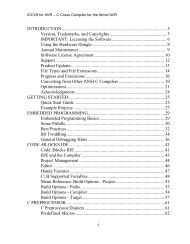Imagecraft c compiler and development environment for the atmel avr
Imagecraft c compiler and development environment for the atmel avr
Imagecraft c compiler and development environment for the atmel avr
Create successful ePaper yourself
Turn your PDF publications into a flip-book with our unique Google optimized e-Paper software.
ICCV8 <strong>for</strong> AVR – C Compiler <strong>for</strong> Atmel AVR char *strcpy(char *s1, const char *s2)copies s2 into s1. It returns s1. size_t strcspn(const char *s1, const char *s2)searches <strong>for</strong> <strong>the</strong> first element in s1 that matches any of <strong>the</strong> elements in s2. Theterminating nulls are considered part of <strong>the</strong> strings. It returns <strong>the</strong> index in s1where <strong>the</strong> match is found. size_t strlen(const char *s)returns <strong>the</strong> length of s. The terminating null is not counted. char *strncat(char *s1, const char *s2, size_t n)concatenates up to n elements, not including <strong>the</strong> terminating null, of s2 into s1. It<strong>the</strong>n copies a null character onto <strong>the</strong> end of s1. It returns s1. int strncmp(const char *s1, const char *s2, size_t n)is <strong>the</strong> same as <strong>the</strong> strcmp function except it compares at most n characters. char *strncpy(char *s1, const char *s2, size_t n)is <strong>the</strong> same as <strong>the</strong> strcpy function except it copies at most n characters. char *strpbrk(const char *s1, const char *s2)does <strong>the</strong> same search as <strong>the</strong> strcspn function but returns <strong>the</strong> pointer to <strong>the</strong>matching element in s1 if <strong>the</strong> element is not <strong>the</strong> terminating null. O<strong>the</strong>rwise, itreturns a null pointer. char *strrchr(const char *s, int c)searches <strong>for</strong> <strong>the</strong> last occurrence of c in s <strong>and</strong> returns a pointer to it. It returns anull pointer if no match is found. size_t strspn(const char *s1, const char *s2)searches <strong>for</strong> <strong>the</strong> first element in s1 that does not match any of <strong>the</strong> elements in s2.The terminating null of s2 is considered part of s2. It returns <strong>the</strong> index where <strong>the</strong>condition is true. char *strstr(const char *s1, const char *s2)finds <strong>the</strong> substring of s1 that matches s2. It returns <strong>the</strong> address of <strong>the</strong> substring ins1 if found <strong>and</strong> a null pointer o<strong>the</strong>rwise. char *strtok(char *s1, const char *delim)103



